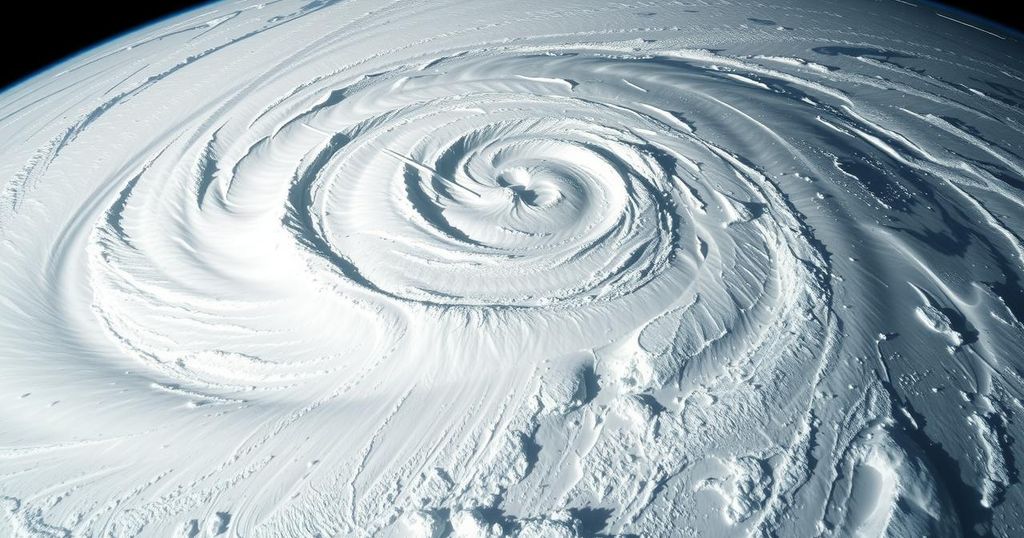Catastrophic Impact of Cyclone Chido on Mayotte and Beyond

Cyclone Chido struck Mayotte on December 14, 2024, leaving widespread destruction and a possible death toll in the hundreds. Initially developing on December 5, it became a strong Category 4 hurricane, causing unprecedented damage to infrastructure and loss of power. The storm also impacted regions in Mozambique, highlighting the extensive humanitarian crises triggered by such extreme weather events.
On December 14, 2024, Cyclone Chido wreaked havoc across the islands of Mayotte, leaving behind a landscape marked by destruction and significant human loss. This cyclone, exhibiting hurricane-force winds, devastated Mayotte, a French overseas territory located in the Indian Ocean. Official reports currently acknowledge 21 fatalities, though estimates suggest that the true death toll may reach hundreds or even thousands, prompting concern from local authorities and international observers alike.
Cyclone Chido emerged as a tropical disturbance on December 5, escalating rapidly within a conducive environment characterized by elevated sea temperatures and diminished wind shear. Following its peak intensity on December 12, with maximum sustained winds soaring to 155 miles per hour—categorizing it as a strong Category 4 hurricane—Chido made landfall on Mayotte, inflicting catastrophic damage.
NASA’s Earth Observatory released chilling satellite images illustrating the extent of the storm’s impact, depicting an island besieged by Chido’s overwhelming forces. These images, captured by the Visible Infrared Imaging Radiometer Suite aboard NOAA-20, provide a stark visual representation of the cyclone’s devastation.
In the aftermath, French officials described the damage as unprecedented. Minister of the Interior, Bruno Retailleau, emphasized the scale of the catastrophe, stating, “What awaits France in Mayotte is colossal: the island is devastated.” President Emmanuel Macron reassured the public regarding the government’s commitment to assist the afflicted residents, declaring a national mourning to honor those who lost their lives.
Meteorological assessments revealed that Cyclone Chido was the most powerful storm to strike Mayotte in over nine decades, causing extensive structural damage across various regions, including major urban centers and infrastructure such as the capital city of Mamoudzou and the airport on Pamandzi. The cyclone has resulted in widespread power outages, leaving countless residents without electricity and complicating recovery efforts within a region grappling with economic hardship.
Cyclone Chido’s effects extended beyond Mayotte as the storm proceeded to landfall in Mozambique on December 15. Reports highlight that approximately 174,000 individuals have been affected in Mozambique, contributing to at least 34 fatalities and substantial property destruction. As the cyclone dissipates over Zimbabwe, its legacy poses significant challenges to recovery efforts both locally and regionally.
Cyclone Chido’s emergence and subsequent devastation underscore the increasing ferocity of tropical storms exacerbated by climatic changes. Mayotte, a critical geographical region facing socio-economic difficulties, was ill-equipped to handle such extreme weather events. Cyclones like Chido not only impact immediate regions but also highlight vulnerabilities throughout the Indian Ocean, where communities often lack the necessary infrastructure for disaster response and recovery. The broader implications of climate patterns on such storms necessitate urgent international attention and collaborative response strategies.
The occurrence of Cyclone Chido serves as a grave reminder of the potential for catastrophic weather events, particularly in economically vulnerable regions like Mayotte. With hundreds, if not thousands, of lives at stake, and critical infrastructure decimated, national and international efforts must focus on thorough recovery and prevention strategies. As communities prepare for the long road ahead, the continued impact on neighboring regions such as Mozambique emphasizes the need for enhanced resilience against future cyclonic events.
Original Source: www.newsweek.com








